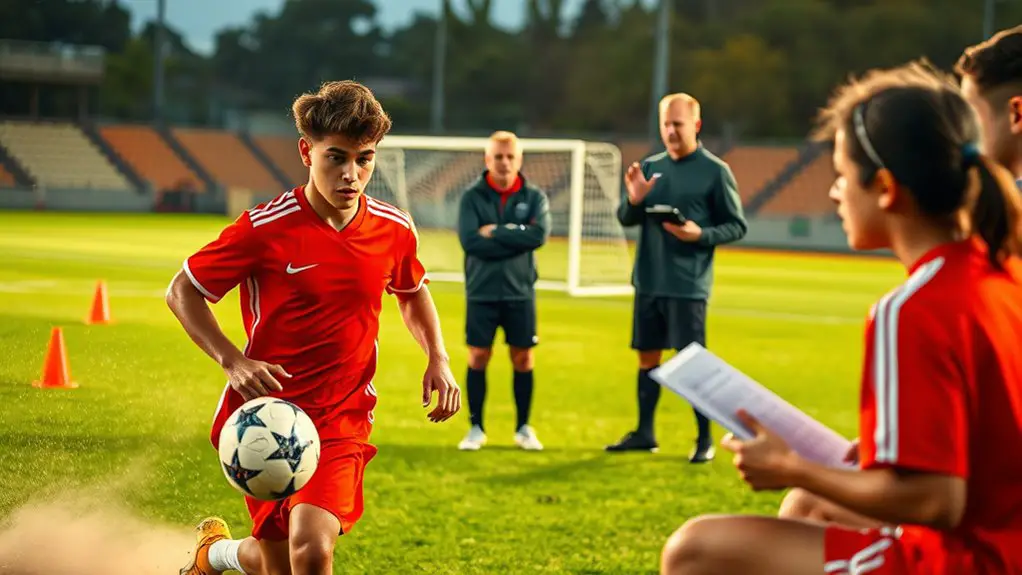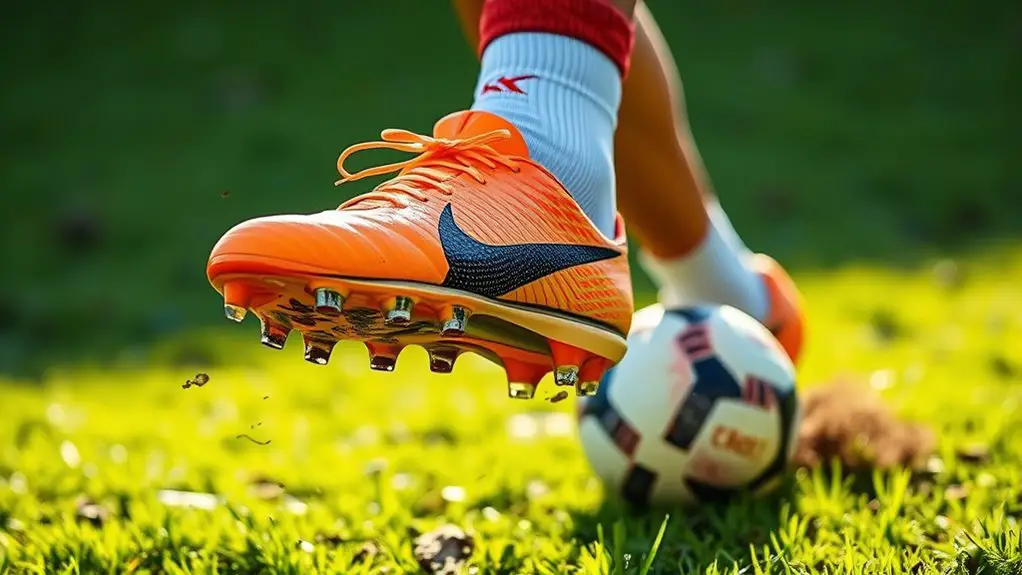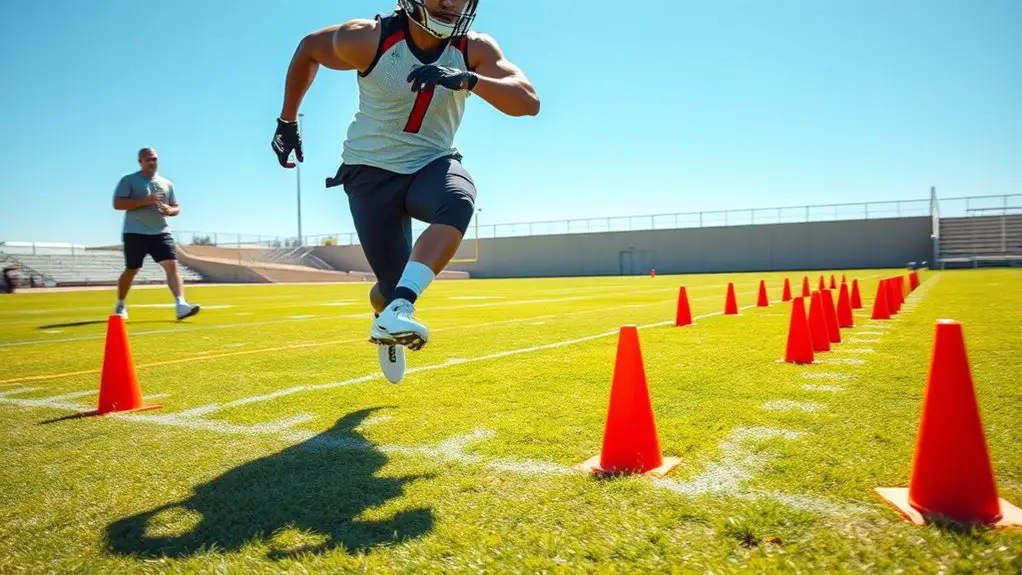To train like a professional soccer player, focus on your fitness and conditioning to build endurance and strength. Master your technical skills with drills for ball control, passing, and shooting. Develop your tactical awareness by studying game dynamics and practicing small-sided games. Don't forget mental preparation; visualization and mindfulness can enhance your focus. Finally, maintain a balanced nutrition plan with carbs, proteins, and healthy fats for peak performance. There's so much more to explore on this journey.
Understanding the Importance of Fitness and Conditioning
When you're aiming to train like a professional soccer player, understanding the importance of fitness and conditioning is essential. It's not just about kicking a ball; it's about building your body to perform at peak levels. The freedom of movement on the field comes from a strong cardiovascular base, allowing you to run, sprint, and recover without hesitation.
Incorporating strength training helps you withstand the physical demands of the game, reducing the risk of injury and enhancing your performance. Flexibility is equally important; it allows you to maneuver and adapt to changing situations effortlessly. Additionally, focusing on consistent mileage during your training can significantly improve your overall endurance and athleticism.
Mastering Technical Skills and Drills
Fitness and conditioning lay the groundwork for your performance, but mastering technical skills and drills is what truly elevates your game. To release your potential, focus on ball control, dribbling, passing, and shooting. Start small—practice juggling the ball or dribbling through cones. These drills help you develop touch and precision, essential for free-flowing play.
Incorporate varied passing drills, like one-touch exercises with a partner, to enhance your accuracy and speed. Don't forget shooting drills, aimed at improving your ability to score from different angles. Mix it up! Challenge yourself with game-like scenarios, simulating pressure and quick decision-making. Consider adding agility ladder drills to your routine, which can boost speed through enhanced footwork and coordination.
Consistency is key; dedicate time each week to refine these skills. Remember, the more you practice, the more freedom you'll feel on the field. Embrace the process, and soon you'll notice your confidence and creativity blossoming, allowing you to express your unique style of play.
Developing Tactical Awareness and Game Intelligence
While mastering technical skills is essential, developing tactical awareness and game intelligence is equally important for becoming a well-rounded soccer player. You need to understand the game beyond just kicking a ball. Start by watching matches, focusing on players' movements, positioning, and decision-making. Ask yourself questions: Why did they make that pass? What's their next move?
In practice, engage in small-sided games that force you to think quickly. This simulates match conditions, improving your ability to read the game. Communicate with teammates; understanding each other's strengths opens up new strategies.
Experiment with different positions in training to gain a broader perspective. The more you know about various roles, the better you can adapt during a game. Remember, it's about finding freedom in your decisions on the field. Embrace the chaos, and let your instincts guide you. Additionally, incorporating mental conditioning techniques can significantly enhance your ability to react quickly under pressure.
Mental Preparation and Focus Techniques
How can you sharpen your mental game to match your physical skills? Mental preparation is essential for any aspiring soccer player. It's not just about the drills on the field; it's about cultivating the right mindset. Here are some practical techniques to enhance your focus:
- Visualization: Picture yourself executing plays successfully. This can boost your confidence and improve performance.
- Mindfulness: Practice being present. Focus on your breath during training to alleviate distractions and sharpen concentration.
- Positive Affirmations: Repeat motivating phrases to yourself. This can reinforce your belief in your abilities and keep negativity at bay.
- Goal Setting: Set clear, achievable goals. This will give you direction and purpose in your training, making each session more meaningful. Additionally, incorporating mindfulness meditation into your routine can enhance focus and reduce anxiety, ultimately improving your overall performance on the field.
Creating a Balanced Nutrition Plan for Optimal Performance
To perform at your best on the soccer field, a well-rounded nutrition plan is vital. You need the right balance of carbohydrates, proteins, and fats to fuel your body. Carbs provide the energy for those intense sprints and quick moves, so load up on whole grains, fruits, and veggies. Proteins help in muscle recovery, so include lean meats, fish, or plant-based sources like beans and nuts.
Don't forget healthy fats; they're essential for overall energy and hormone balance. Avocados, olive oil, and seeds are great choices. Stay hydrated, too—water is your best friend. Proper hydration supports optimal performance and helps you avoid fatigue and cramps on the field.
Consider timing your meals; eat a mix of carbs and protein about 30 minutes before practice for maximum energy. Afterward, refuel with a nutritious snack to aid recovery. Remember, your nutrition plan should feel empowering, not restrictive. Embrace your choices, and enjoy the journey to peak performance!
Frequently Asked Questions
How Many Hours Should I Train Each Week?
They say practice makes perfect, so aim for 10 to 15 hours a week. Balance your training with rest, and don't forget to enjoy the journey—freedom in your progress is what truly matters.
What Equipment Do I Need for Training?
For effective training, you'll need a soccer ball, cones for dribbling drills, agility ladders, resistance bands, and proper footwear. A good water bottle and a reliable watch can also help you track progress.
How Can I Prevent Injuries While Training?
Injuries can limit your freedom, but prevention keeps you on the field. You should warm up properly, listen to your body, and incorporate rest days. Balancing intensity with recovery's key to staying injury-free and enjoying training.
What Role Does Rest Play in My Training?
Rest's essential in your training; it helps your body recover, rebuild, and grow stronger. Without adequate rest, you risk burnout and injury. Embrace downtime as part of your journey to peak performance and overall well-being.
How Can I Find a Training Partner or Coach?
Finding a training partner or coach's easier than you think! Reach out to local sports clubs, join online communities, or ask friends. Connecting with like-minded individuals will help you stay motivated and improve together.




